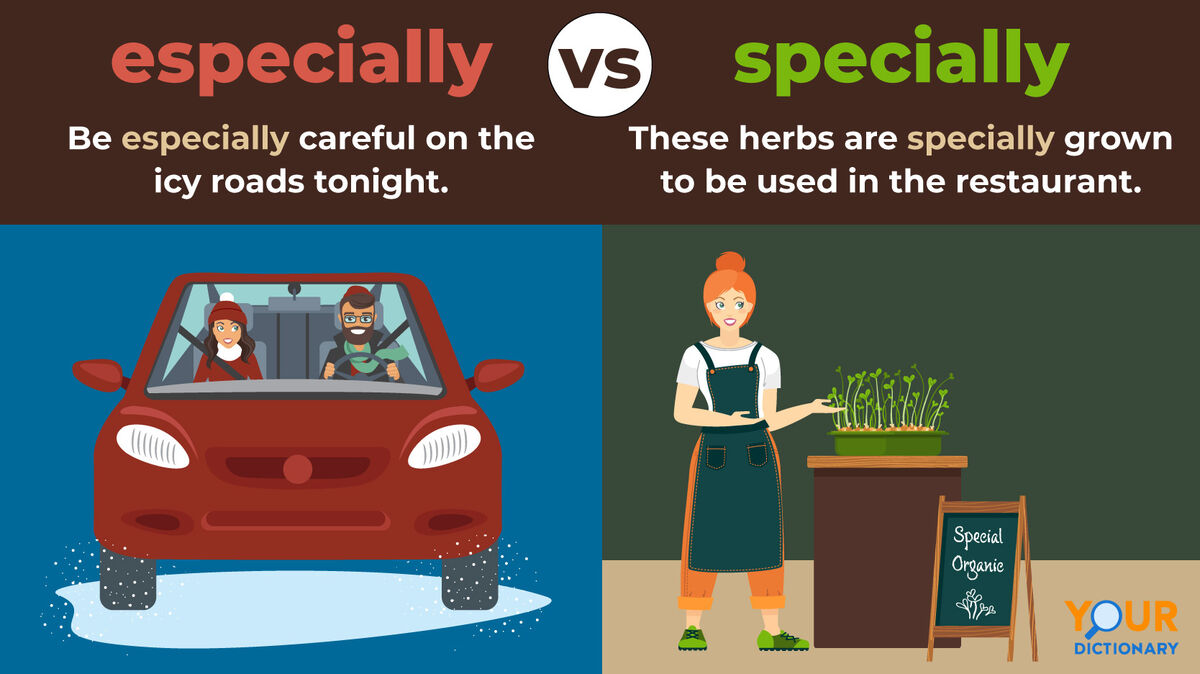
Are you especially trained, or are you specially trained? Should you be especially grateful for a gift or specially grateful? There's only one letter difference between these words, but that one letter changes the whole meaning! Discover when to use especially vs. specially in writing and conversation.
Especially vs. Specially: The Difference Explained
While they are deceptively similar, the words especially and specially have distinct differences.
- especially - emphasizes or singles out one person, place or thing above all others
- specially - for a special reason or purpose
Both Can Mean 'Particularly'
There are some cases where especially can mean "particularly," as in "this one apart from the others." It relates to its meaning of "above all." These instances include:
- I'm going to miss my family this summer, especially my mom.
- My neighbor gets annoyed easily, especially when people park in front of his house.
- George gets very enthusiastic during football games, especially when his team wins.
There are also some cases in which you can use either especially or specially to indicate a particular item or detail. For example:
- The office was designed especially/specially for our department.
- We bought the dog food that was formulated especially/specially for puppies.
- I made dinner especially/specially for you.
In these cases, it's a matter of personal preference. If you're trying to choose between specially and especially to describe something in particular and you're not emphasizing that one option is separate from the other, either word would work.
Especially Means 'Above All'
Both especially and specially are adverbs that describe more about a verb or adjective. You use especially when you want to say "above all" or "to a great extent." When you use especially in this way, it typically appears in an adjective phrase (before the adjective).
Examples of especially to mean "above all" include:
- I'm especially grateful for your support this year.
- Be especially careful on the icy roads tonight.
- My brother is especially knowledgeable about Julius Caesar and the Roman Empire.
- Mr. Finnigan isn't especially worried about his lecture next week.
- Gia is especially interested in dinosaurs and geology.
If you can replace especially with very or exceptionally, then you're using it correctly in this context. For example, "I'm very grateful for your support this year" only works with especially. Specially does not have a meaning to indicate "above all."
Specially Means 'For a Special Reason'
Even though especially is more common and versatile than specially, it's not always the right word for the context. The word specially is correct when you're describing an action taken "for a special reason" or "for a special purpose."
For example:
- This car was specially designed for people who use a wheelchair.
- Many dogs are specially trained to assist police officers in dangerous situations.
- Loretta has all of her suits specially tailored in Italy.
- The decorated cake was specially made for the museum opening.
- These herbs are specially grown to be used in the restaurant.
Notice how you can use specifically in each of these sentences instead of specially. You also can't use especially in any of these cases, as they don't indicate that one choice is above the others.
Origins of Especially and Specially
Especially and specially have the same Latin root, but they took different roads to arrive at different meanings. They both come from the Latin specialis, which means "belonging to a kind or species." Then the word origins differ:
- especially (14th century) - from the Old French especial
- specially (12th century) - from Middle English special
Like most Latin words that begin with "sp", especially gained an "e" when it made its way into Old French. Specially appeared in English long before especially, and was used differently. Even though specially and especially have the same root, they are still used differently to this day.
Make Your Vocabulary Especially Accurate
Now that you know when to use especially or specially, your writing will be especially engaging to your reader! Clear up other misunderstandings with these tips on differentiating between loose vs. lose. Or, if you've never been quite sure how to use pique in a sentence, check out the difference between peek vs. peak vs. pique.